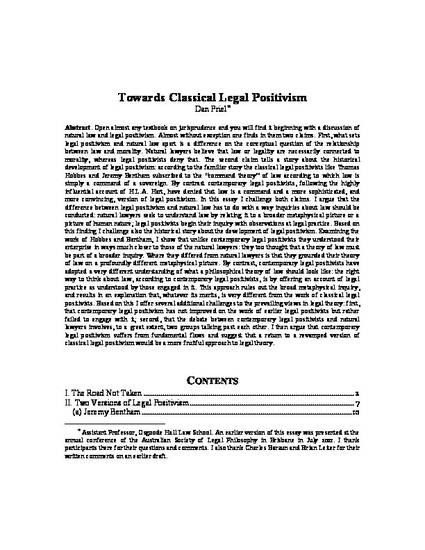
Open almost any textbook on jurisprudence and you will find it beginning with a discussion of natural law and legal positivism. Almost without exception one finds in them two claims. First, what sets legal positivism and natural law apart is a difference on the conceptual question of the relationship between law and morality. Natural lawyers believe that law or legality are necessarily connected to morality, whereas legal positivists deny that. The second claim tells a story about the historical development of legal positivism: according to the familiar story the classical legal positivists like Thomas Hobbes and Jeremy Bentham subscribed to the “command theory” of law according to which law is simply a command of a sovereign. By contrast contemporary legal positivists, following the highly influential account of H.L.A. Hart, have denied that law is a command and a more sophisticated, and more convincing, version of legal positivism. In this essay I challenge both claims. I argue that the difference between legal positivism and natural law has to do with a way inquiries about law should be conducted: natural lawyers seek to understand law by relating it to a broader metaphysical picture or a picture of human nature; legal positivists begin their inquiry with observations at legal practice. Based on this finding I challenge also the historical story about the development of legal positivism. Examining the work of Hobbes and Bentham, I show that unlike contemporary legal positivists they understood their enterprise in ways much closer to those of the natural lawyers: they too thought that a theory of law must be part of a broader inquiry. Where they differed from natural lawyers is that they grounded their theory of law on a profoundly different metaphysical picture. By contrast, contemporary legal positivists have adopted a very different understanding of what a philosophical theory of law should look like: the right way to think about law, according to contemporary legal positivists, is by offering an account of legal practice as understood by those engaged in it. This approach rules out the broad metaphysical inquiry, and results in an explanation that, whatever its merits, is very different from the work of classical legal positivists. Based on this I offer several additional challenges to the prevailing views in legal theory: first, that contemporary legal positivism has not improved on the work of earlier legal positivists but rather failed to engage with it; second, that the debate between contemporary legal positivists and natural lawyers involves, to a great extent, two groups talking past each other. I then argue that contemporary legal positivism suffers from fundamental flaws and suggest that a return to a revamped version of classical legal positivism would be a more fruitful approach to legal theory.
- jurisprudence,
- legal positivism,
- natural law,
- Thomas Hobbes,
- Jeremy Bentham
Available at: http://works.bepress.com/dan_priel/3/
